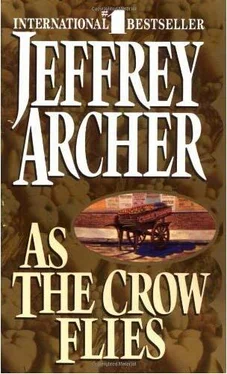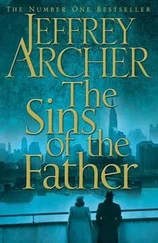Charlie continued to stare at Mrs. Symonds as she picked up her bag, waved a cheery goodbye and walked out of the shop.
Despite Mrs. Symonds' bombshell and Syd Wrexall's efforts to contain him, Charlie went about plotting his next acquisition. Through the combination of Major Arnold's diligence, Mr. Crowther's inside knowledge and Mr. Hadlow's loans, by late July Charlie had secured the freehold on two more shops in the Terrace—Number 133, women's clothes, and Number 101, wine and spirits. At the August board meeting Becky recommended that Major Arnold be promoted to deputy managing director of the company, with the task of keeping a watching brief on everything that was taking place in Chelsea Terrace.
Charlie had desperately needed an extra pair of eyes and ears for some time, and with Becky still working at Sotheby's during the day Arnold had begun to fill that role to perfection. The colonel was delighted to ask Becky to minute the confirmation of the major's appointment. The monthly meeting continued very smoothly until the colonel asked, "Any other business?"
"Yes," said Charlie. "What's happening about the flats?"
"I put in a bid of two thousand pounds as instructed," said Crowther. "The agent said he would recommend his clients should accept the offer, but to date I've been unable to close the deal."
"Why?" asked Charlie.
"Because Savill's rang back this morning to let me know that they have received another offer—far in excess of what they had anticipated for this particular piece of property. They thought I might want to alert the board of the present situation."
"They were right about that," said Charlie. "But how much is this other offer? That's what I want to know."
"Two thousand five hundred pounds," said Crowther.
It was several moments before anyone round the boardroom table offered an opinion.
"How on earth can they hope to show a return on that kind of investment?" Hadlow eventually asked.
"They can't," said Crowther.
"Offer them three thousand pounds."
"What did you say?" said the chairman, as they all turned to face Charlie.
"Offer them three thousand," Charlie repeated.
"But Charlie, we agreed that two thousand was a high enough price only a few weeks ago," Becky pointed out. "How can the flats suddenly be worth so much more?"
"They're worth whatever someone is willing to pay for them," Charlie replied. "So we've been left with no choice."
"But Mr. Trumper—" began Hadlow.
"If we end up with the rest of the block but then fail to get our hands on those flats, everything I have worked for will go up the spout. I'm not willing to risk that for three thousand pounds or, as I see it, five hundred."
"Yes, but can we afford such a large outlay just at this moment?" asked the colonel.
"Five of the shops are now showing a profit," said Becky, checking her inventory. "Two are breaking even and only one is actually losing money consistently."
"We must have the courage to go ahead," said Charlie. "Buy the flats, knock 'em down and then we can build half a dozen shops in their place. We'll be making a return on them before anyone can say 'Bob's your uncle.'"
Crowther gave them all a moment to allow Charlie's strategy to sink in, then asked, "So what are the board's instructions?"
"I propose that we offer three thousand pounds," said the colonel. "As the managing director has pointed out, we must take the long view, but only if the bank feels able to back us on this one. Mr. Hadlow?"
"You can just about afford three thousand pounds at the moment," said the bank manager, checking over the figures. "But that would stretch your overdraft facility to the limit. It would also mean that you couldn't consider buying any more shops for the foreseeable future."
"We don't have a choice," said Charlie, looking straight at Crowther. "Someone else is after those flats and we can't at this stage allow a rival to get their hands on them."
"Well, if those are the board's instructions I shall attempt to close the deal later today, at three thousand pounds."
"I think that's precisely what the board would wish you to do," confirmed the chairman, as he checked around the table. "Well, if there's no other business, I declare the meeting closed."
Once the meeting had broken up, the colonel took Crowther and Hadlow on one side. "I don't like the sound of this flats business at all. An offer coming out of the blue like that requires a little more explanation."
"I agree," said Crowther. "My instinct tells me that it's Syd Wrexall and his Shops Committee trying to stop Charlie taking over the whole block before it's too late."
"No," said Charlie as he joined them. "It can't be Syd because he doesn't have a car," he added mysteriously. "In any case, Wrexall and his cronies would have reached their limit long before two thousand five hundred pounds."
"So do you think it's an outside contractor?" asked Hadlow, "who has his own plans for developing Chelsea Terrace?"
"More likely to be an investor who's worked out your long-term plan and is willing to hang on until we have no choice but to pay the earth for them," said Crowther.
"I don't know who or what it is," said Charlie. "All I'm certain of is that we've made the right decision to outbid them."
"Agreed," said the colonel. "And Crowther, let me know the moment you've closed the deal. Afraid I can't hang about now. I'm taking a rather special lady to lunch at my club."
"Anyone we know?" asked Charlie.
"Daphne Wiltshire."
"Do give her my love," said Becky. "Tell her we're both looking forward to having dinner with them next Wednesday."
The colonel raised his hat to Becky, and left his four colleagues to continue discussing their different theories as to who else could possibly be interested in the flats.
Because the board meeting had run on later than he anticipated the colonel only managed one whisky before Daphne was ushered through to join him in the Ladies' Room. She had, indeed, put on a few pounds, but he didn't consider she looked any the worse for that.
He ordered a gin and tonic for his guest from the club steward, while she chatted about the gaiety of America and the heat of Africa, but he suspected that it was another continent entirely that Daphne really wanted to talk about.
"And how was India?" he eventually asked.
"Not so good, I'm afraid," said Daphne before pausing to sip her gin and tonic. "In fact, awful."
"Funny, I always found the natives rather friendly," said the colonel.
"It wasn't the natives who turned out to be the problem," replied Daphne.
"Trentham?"
"I fear so."
"Hadn't he received your letter?"
"Oh, yes, but events had long superseded that, Colonel. Now I only wish I had taken your advice and copied out your letter word for word warning him that if the question were ever put to me directly I would have to tell anyone who asked that Trentham was Daniel's father."
"Why? What has caused this change of heart?"
Daphne drained her glass in one gulp. "Sorry Colonel, but I needed that. Well, when Percy and I arrived in Poona the first thing we were told by Ralph Forbes, the Colonel of the Regiment, was that Trentham had resigned his commission."
"Yes, you mentioned as much in your letter." The colonel put his knife and fork down. "What I want to know is why?"
"Some problem with the adjutant's wife, Percy later discovered, but no one was willing to go into any detail. Evidently the subject's taboo—not the sort of thing they care to discuss in the officers' mess."
"The unmitigated bastard. If only I—"
"I couldn't agree with you more, Colonel, but I must warn you that there's worse to come."
The colonel ordered another gin and tonic for his guest and a whisky for himself before Daphne continued.
Читать дальше












